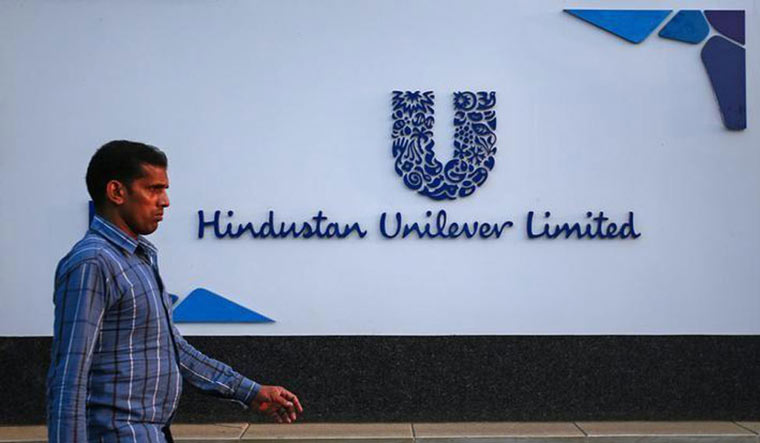Hindustan Unilever reported good results this week. Its standalone net profit was up 12 per cent year-on-year to Rs 2,505 crore from Rs 2,243 crore in the October-December quarter. Sales for the third quarter rose 16 per cent to Rs 14,986 crore from Rs 12,900 crore.
Yet, shares of the largest fast-moving consumer goods maker in the country slumped 3.8 per cent on Friday to close at Rs 2,548.35 on the BSE. The earnings of HUL were overshadowed by one other major announcement. The maker of Surf detergent and Red Label tea said its board of directors had approved a proposal to enter a new arrangement with parent Unilever for the provision of technology, trademark licenses and services to HUL.
Under the new agreement, the royalty and central services fees will increase to 3.45 per cent from 2.65 per cent of the turnover. The arrangement, which is subject to regulatory approvals, is to be effected in a staggered manner over three years.
HUL is the subsidiary of the Anglo-Dutch FMCG giant Unilever. A technology, trademark license and central services agreement with Unilever allows HUL the right to use Unilever-owned trademarks, technology, and corporate logo and gives access to central services provided by Unilever group.
HUL says the previous agreement was entered into in 2013 for ten years and during that period, HUL doubled its turnover and improved its EBITDA (earnings before interest, taxes, depreciation and amortization) margin by 1000 basis points.
“HUL has been receiving a steady stream of benefits from Unilever in terms of faster innovations, superior products and technology, greater expertise, and enhanced services. This helps HUL to continue to meet emerging consumer needs with agility and create value for all stakeholders,” it stated.
The new royalty arrangements are for a period of five years only and will be effective from February 1, 2023. Between February-December 2023, HUL’s effective cost will increase 45 bps, it will go up 25 bps in 2024 and another 10 bps effective January 2025.
The higher royalty payouts will have a bearing on the company’s earnings in the near to mid-term, which will in turn weigh on the company’s shares. These worries led to Friday’s selling.
“While HUL gained 10 percentage points margins between 2013 to 2023, however, given the current margin band of 23-25 per cent, 80 bps royalty rate increase over three years will curtail margin expansion. In the absence of meaningful margin expansion beyond 2023-24, sales and profit after tax growth will move in tandem which will prevent meaningful re-rating of the stock,” said Amnish Aggarwal, head of research at Prabhudas Lilladher.
“Given the valuations already at 45.2 times 2024-25 earnings per share expectation, expect moderate returns in near-term,” he further said.
“The hike in royalty to Unilever takes near-term earnings down by 2-3 per cent, but sentiments down likely a few notches more,” is how Richard Liu of JM Financial Institutional Securities summed up.
Varun Lohchab, head of institutional research at HDFC Securities, says the royalty increase may not “pinch much” given the softening of raw materials, but will “limit” the margin expansion.
Analysts at Motilal Oswal Financial Services, however, say they are not “particularly perturbed” if HUL receives commensurate benefits from the parent. Also, even at 3.45 per cent, HUL’s royalty rate will be well below that of other consumer goods companies like Nestle India, Colgate and Procter & Gamble Hygiene and Healthcare, which is around 5 per cent, the analysts added.
Despite the higher royalty overhang, analysts mostly remain positive on the company’s potential to deliver strong growth amid tough competition over the long term, although in the near-term, demand pickup in the industry is expected to be gradual.
“HUL continues to exhibit remarkable dexterity, despite its size, led by its WIMI (winning in many Indias) and cluster-based approach, its technological edge over peers and funnelling massive cost savings back into the business for growth,” said the Motilal Oswal analysts.
Liu of JM Financial said HUL was one of their “preferred” plays in the consumer staples space, but, “the stock is likely to take a short-term beating given the negative sentiments around the royalty angle.”
Manoj Menon, head of research at ICICI Securities, pointed out that HUL’s market share gains in fabric wash, both in value and volume and HFD (health food drinks) had been encouraging.
“Premium discretionary (within staples) is outperforming mass discretionary, and HUL is (somewhat) better placed at the former,” he said.
“Continued work in category development is also tracking well,” added Menon.




